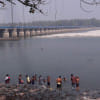Teesta Deal: India holds out hope
India yesterday held out hopes of the Teesta river water-sharing deal with Bangladesh and said not being able to reach the agreement cannot yet be termed a “failure” of Prime Minister Narendra Modi government's four-year rule as it still had one more year in office.
Asked by reporters if the inability to sign the Teesta deal could not be considered a failure of the Modi government since the Indian PM had insisted in April last year that it would happen during his tenure, Indian External Affairs Minister Sushma Swaraj said, “Our government has completed four years in office and still has one year to left. So, not reaching the Teesta treaty cannot yet be called a failure of this government.”
Swaraj made the remarks while addressing a press conference here, listing the achievements of the Modi government in foreign policy in the last four years.
Asked about the Teesta issue figuring in Bangladesh Prime Minister Sheikh Hasina's talks with Modi and West Bengal Chief Minister Mamata Banerjee on May 25 and 26, Swaraj said Mamata in April last year had given an alternative proposal of supplying the waters of Torsa river, instead of Teesta, as West Bengal would suffer if Teesta water had to be shared.
Swaraj said hydrology experts were still studying the feasibility of Mamata's alternative proposal and were yet to submit a report on their findings.
She said the federal Indian government could not bypass the West Bengal government as it was the state which had to share the Teesta waters and had to weigh pros and cons of how much would be affected by the proposed deal.
“So, West Bengal and Chief Minister Mamata ji have a role to play in this, which the central government cannot overlook,” the external affairs minister remarked.
Mamata had vetoed the Teesta deal since September 2011 and had opted out of a trip with the then Indian PM Manmohan Singh to Dhaka to sign the treaty.
Mamata also repeatedly made it clear that she could not ignore the interests of the northern part of West Bengal while sharing Teesta water as it was the main lifeline in the northern region for irrigation, power generation and drinking. She argued that farmers in northern West Bengal would be severely affected if the Teesta's water flow decreased due to sharing as there were already a numbers of dams on the river.

 For all latest news, follow The Daily Star's Google News channel.
For all latest news, follow The Daily Star's Google News channel. 








Comments